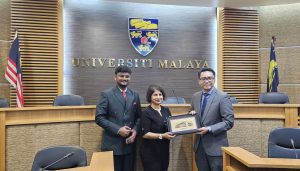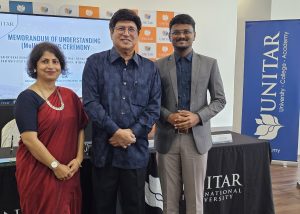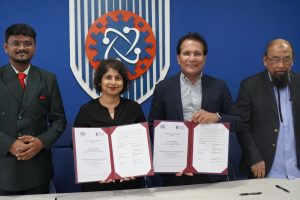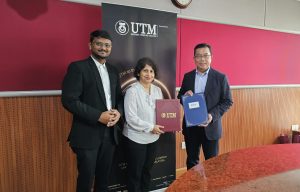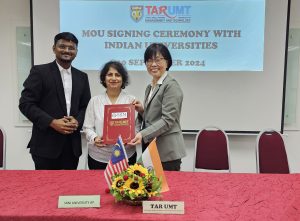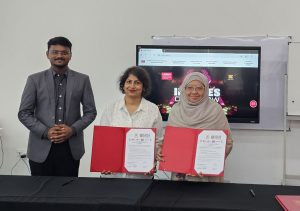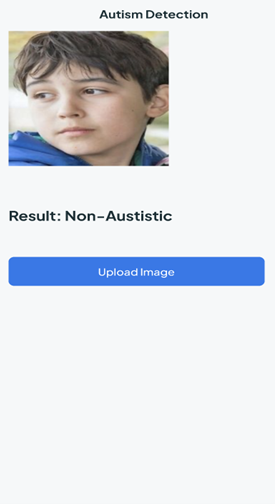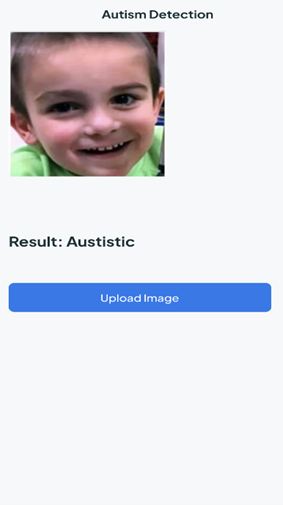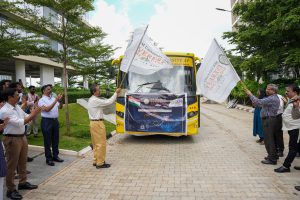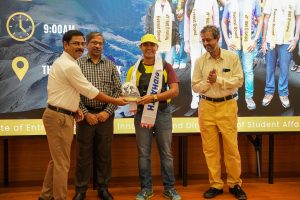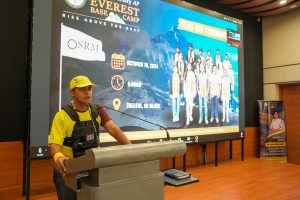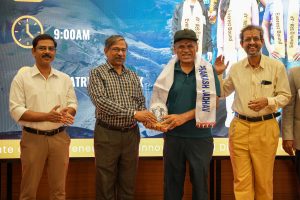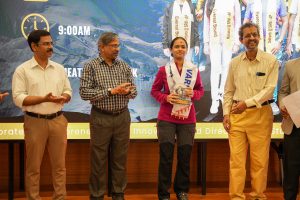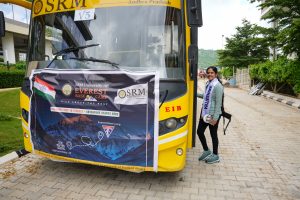All Management Events
- SRM AP Partners with Amaravati Drone Summit 2024 October 16, 2024
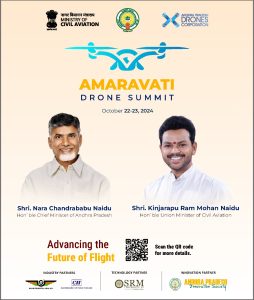 The Government of Andhra Pradesh has announced its partnership with SRM University-AP as its technology partner for the Amaravati Drone Summit 2024. The Summit will feature Union Minister of Civil Aviation, Shri. Kinjarapu Ram Mohan Naidu and the Chief Minister of Andhra Pradesh, Shri. Chandra Babu Naidu. Their presence will underscore the importance of the Summit and signal the government’s commitment to embracing new technologies that have the potential to revolutionise various sectors.
The Government of Andhra Pradesh has announced its partnership with SRM University-AP as its technology partner for the Amaravati Drone Summit 2024. The Summit will feature Union Minister of Civil Aviation, Shri. Kinjarapu Ram Mohan Naidu and the Chief Minister of Andhra Pradesh, Shri. Chandra Babu Naidu. Their presence will underscore the importance of the Summit and signal the government’s commitment to embracing new technologies that have the potential to revolutionise various sectors.The summit will feature thought-provoking sessions by Vice Chancellor Prof. Manoj K Arora, along with other industry and academic leaders. Additionally, a dedicated exhibition aimed at showcasing solutions and addressing challenges encountered in technology operations will be featured. The Summit will also host Hackathons for students, providing them with a platform to demonstrate their skills and technological expertise. The university’s Centre for Drone Technology will take active part in mutliple sessions at the summit.
By nominating SRM University-AP as its technological partner, the Government of Andhra Pradesh is leveraging the university’s state-of-the-art research facilities and its pool of talented Faculty, researchers and students. This partnership is expected to not only provide a platform for showcasing cutting-edge drone technology but also to spur research and development in this rapidly evolving field.
The event is poised to become a landmark occasion, paving the way for new collaborations and innovations that could redefine the boundaries in the world of technology.
Continue reading → - SRM AP Expands Horizons with India-Malaysia Academic Expedition October 16, 2024
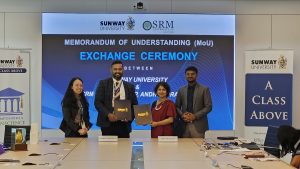 The Directorate of International Relations and Higher Studies (IR & HS), led by Dr Sudeshna Saha, Assistant Director and Sandeep Samala, Deputy Manager, embarked on a fruitful academic expedition tour to Kuala Lumpur from September 30 to October 3, 2024. This initiative aimed to foster collaboration between SRM University-AP and several prestigious Malaysian institutions.
The Directorate of International Relations and Higher Studies (IR & HS), led by Dr Sudeshna Saha, Assistant Director and Sandeep Samala, Deputy Manager, embarked on a fruitful academic expedition tour to Kuala Lumpur from September 30 to October 3, 2024. This initiative aimed to foster collaboration between SRM University-AP and several prestigious Malaysian institutions.The primary objectives of the expedition were to explore collaborative opportunities, identify potential research partnerships, and promote matching grants that would mutually benefit the participating institutions.
During the expedition, a significant milestone was achieved with the signing of Memorandums of Understanding (MoUs) with several prominent Malaysian universities. Among them were the University of Malaya (#60 in QS World University Rankings 2025), Universiti Teknologi Malaysia (#181), Sunway University (#539), and Universiti Tunku Abdul Rahman (#800-#850). Additionally, collaborations were established with Malaysia University of Science and Technology (#88 in Asian University Rankings-Southeastern Asia 2024), Tunku Abdul Rahman University of Management and Technology (#139), University Malaysia of Computer Science & Engineering, and UNITAR International University.The primary objectives of the visit were multi-faceted:
1. Exploring Collaborative Opportunities: The expedition aimed to identify and establish potential research collaborations between SRM University-AP and Malaysian institutions, fostering an environment conducive to joint academic exploration.
2. Promoting Matching Grants: The delegation sought to encourage initiatives such as matching grants that mutually benefit both institutions, enhancing research capabilities and funding opportunities.
3. Co-hosting Conferences: Plans were established to organise joint conferences, seminars, or workshops that facilitate the sharing of research findings and help build a robust academic network.
4. Collaborating on Scientific Projects: The institutions discussed initiating and supporting collaborative scientific research projects reflecting their combined strengths.
5. Focused Research Areas: Identifying key research areas for collaboration was paramount, with a commitment to connect with relevant Points of Contact (PIC) at the University of Malaya.
6. Joint Publications: The MoUs aim to foster partnerships for co-authored publications, thereby benefiting both institutions’ academic output.
7. Postgraduate Supervision: The institutions are committed to enhancing academic development by collaborating in the joint supervision of postgraduate students, emphasising PhD candidates.
8. Staff Mobility & Research Initiatives: A significant focus was placed on facilitating academic staff exchange programs to promote staff mobility and collaborative research initiatives.
9. Undergraduate Mobility Programs: Developing student mobility programs, including summer schools or student exchange opportunities, for undergraduates was a key part of the discussions.
The expedition successfully laid the groundwork for future collaborations, focusing on immersion programs, research internships, student and faculty mobility, and joint research initiatives.
As SRM University-AP continues to establish itself as a leader in higher education, this journey to Malaysia represents a commitment to nurturing global academic relationships and empowering the next generation of learners through collaborative endeavors.
Continue reading → - Professors Develop Fish Scale SERS Substrates for Pollutant Detection October 16, 2024
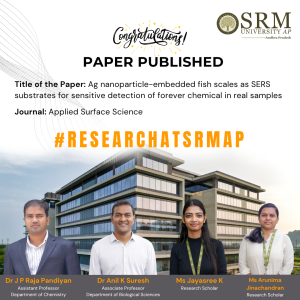 Surface-Enhanced Raman Spectroscopy (SERS), a technique that helps scientists detect tiny amounts of substances, is used for checking pollutants in our environment and the food we eat. However, using this method can be tricky because sometimes other substances can interfere. To overcome these challenges, scientists are working on better ways to prepare samples and analyse the data with a quick and easy way to find harmful pollutants called PFOSA in human urine, soil, and water using a fish scale-based substrate. This remarkable research titled, “Ag nanoparticle-embedded fish scales as SERS substrates for sensitive detection of forever chemical in real samples” by faculty members from the Department of Chemistry and Department of Biological Sciences, Dr J P Raja Pandiyan and Dr Anil K Suresh, along with their research scholars, Ms Jayasree K and Ms Arunima J, have opened up new avenues, demonstrating a significant advancement in the field of science.
Surface-Enhanced Raman Spectroscopy (SERS), a technique that helps scientists detect tiny amounts of substances, is used for checking pollutants in our environment and the food we eat. However, using this method can be tricky because sometimes other substances can interfere. To overcome these challenges, scientists are working on better ways to prepare samples and analyse the data with a quick and easy way to find harmful pollutants called PFOSA in human urine, soil, and water using a fish scale-based substrate. This remarkable research titled, “Ag nanoparticle-embedded fish scales as SERS substrates for sensitive detection of forever chemical in real samples” by faculty members from the Department of Chemistry and Department of Biological Sciences, Dr J P Raja Pandiyan and Dr Anil K Suresh, along with their research scholars, Ms Jayasree K and Ms Arunima J, have opened up new avenues, demonstrating a significant advancement in the field of science.Abstract:
Surface-enhanced Raman spectroscopy (SERS) has emerged as one of the most promising analytical tools in recent years due to its advantageous features such as high sensitivity, specificity, ease of operation, and rapid analysis. These attributes make SERS particularly well-suited for environmental and food analysis. However, detecting target analytes in real samples using SERS faces several challenges, including matrix interference, low analyte concentrations, sample preparation complexity, and reproducibility issues. Additionally, the chemical complexity of pollutants and environmental factors can impact SERS measurements. Overcoming these hurdles demands optimised experimental conditions, refined sample preparation methods, and advanced data analysis techniques, often necessitating interdisciplinary collaborations for effective analysis. Therefore, our focus lies in the development of various methods for fabricating SERS substrates, pretreating analytes, and devising sample preparation strategies. These efforts aim to enable the detection of analytes like Perfluorooctane sulfonamide (PFOSA) – a toxic environmental pollutant within complex real samples, including human urine, lake water, and soil samples.
Practical / Social Implications:
SERS Community: Introducing a facile fabrication method for developing filter paper-based substrates, utilizing evaporation-induced self-assembly methods with the aid of 96-well plates. These substrates boast exceptional sensitivity and uniformity, exhibiting a relative standard deviation (RSD) of 8.2%. They offer easy fabrication and serve as effective SERS substrates for various applications.
Industry and Government Bodies: This invention plays a pivotal role in assessing contamination in food and water bodies, serving as a crucial tool in monitoring
environmental contamination through on-site analysis with portable instruments. It ensures adherence to regulatory standards and safeguards public health.Research: Beyond its practical applications, the invention supports scientific research endeavours focused on identifying microplastic contaminants in real-world samples using portable Raman spectrometers. This not only aids ongoing research but also paves the way for future studies in this critical field.
Collaborations:
1. Dr Hemanth Noothalapati Raman Project Center for
Medical and Biological
Applications, Shimane
University, Matsue 690-8504,
Japan2. Dr Murali Krishna C. Advanced Centre for
Treatment, Research and
Education in Cancer, Tata
Memorial Centre, Navi
Mumbai 410210, India3. Dr Soma Venugopal University of Hyderabad, India
Future Research Plans:
Harnessing SERS for the Detection of Emerging Contaminants in Environmental and Food Matrices
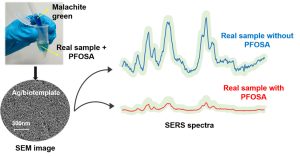
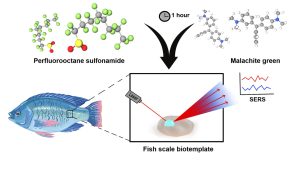
Continue reading → - Enhancing Vehicle Security with Blockchain and Hybrid Computing October 15, 2024
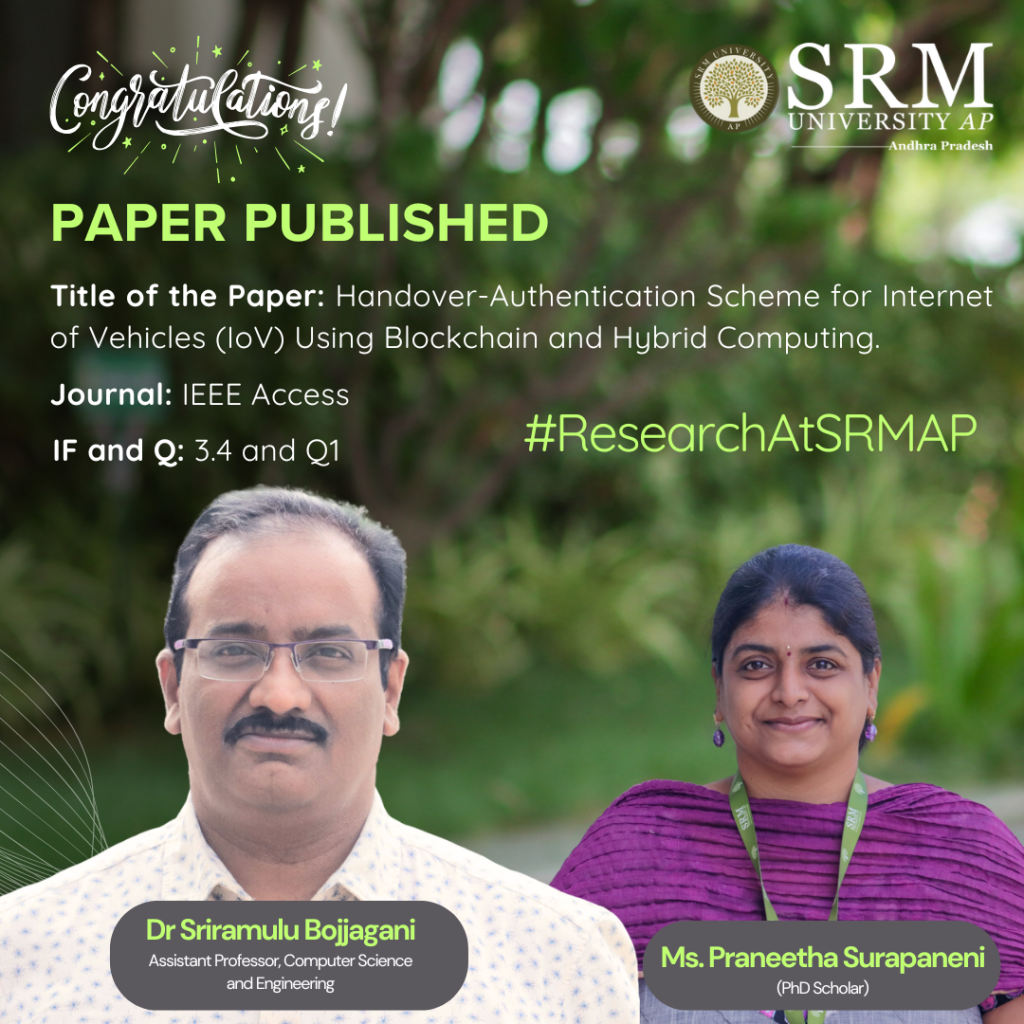 Dr Sriramulu Bojjagani, Assistant Professor, Department of Computer Science and Engineering and his research scholar, Ms Praneeta Supraneni, have proposed a secure and novel way to safeguard cars from being hacked, data breaches, and unauthorised access. Their research paper titled “Handover-Authentication Scheme for the Internet of Vehicles (IoV) using Blockchain and Hybrid Computing” will now improve transparency and traceability of your cars. Read the interesting abstract to learn more!
Dr Sriramulu Bojjagani, Assistant Professor, Department of Computer Science and Engineering and his research scholar, Ms Praneeta Supraneni, have proposed a secure and novel way to safeguard cars from being hacked, data breaches, and unauthorised access. Their research paper titled “Handover-Authentication Scheme for the Internet of Vehicles (IoV) using Blockchain and Hybrid Computing” will now improve transparency and traceability of your cars. Read the interesting abstract to learn more!Abstract:
The advancements in telecommunications are significantly benefiting the Internet of Vehicles (IoV) in various ways. Minimal latency, faster data transfer, and reduced costs are transforming the landscape of IoV. While these advantages accompany the latest improvements, they also expand cyberspace, leading to security and privacy concerns. Vehicles rely on trusted authorities for registration and authentication processes, resulting in bottleneck issues and communication delays. Moreover, the central trusted authority and intermediate nodes raise doubts regarding transparency, traceability, and anonymity. This paper proposes a novel vehicle authentication handover framework leveraging blockchain, IPFS, and hybrid computing. The framework uses a Proof of Reputation (PoR) consensus mechanism to improve transparency and traceability and the Elliptic Curve Cryptography (ECC) cryptosystem to reduce computational delays. The suggested system assures data availability, secrecy, and integrity while maintaining minimal latency throughout the vehicle re-authentication process. Performance evaluations show the system’s scalability, with creating keys, encoding, decoding, and registration operations done rapidly. Simulation is performed using SUMO to handle vehicle mobility in IoV environment. The findings demonstrate the practicality of the proposed framework in vehicular networks, providing a reliable and trustworthy approach for IoV communication
Practical Implementation / Social Implications:
The practical application of this research can significantly improve the safety and reliability of autonomous vehicles and connected vehicle networks. By securing the handover process, it reduces the risk of hacking, data breaches, and unauthorized access, making connected vehicle systems safer for the public and contributing to the development of smart transportation infrastructures.
Future Research Plans:
Moving forward, we plan to focus on optimizing blockchain solutions for large-scale IoT and smart city applications, with a particular interest in improving consensus mechanisms and security protocols for real-time operations, such as autonomous driving and smart energy grids.
Continue reading →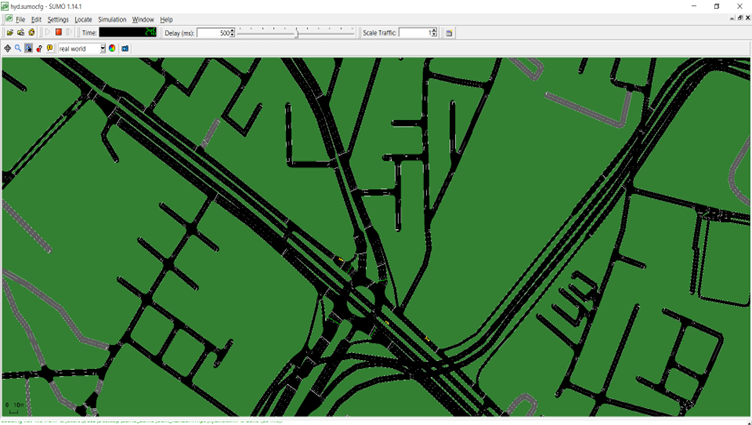
- The Vision of ‘Moner Manush’ through the Lens of Dr Sayantan’s Research October 15, 2024
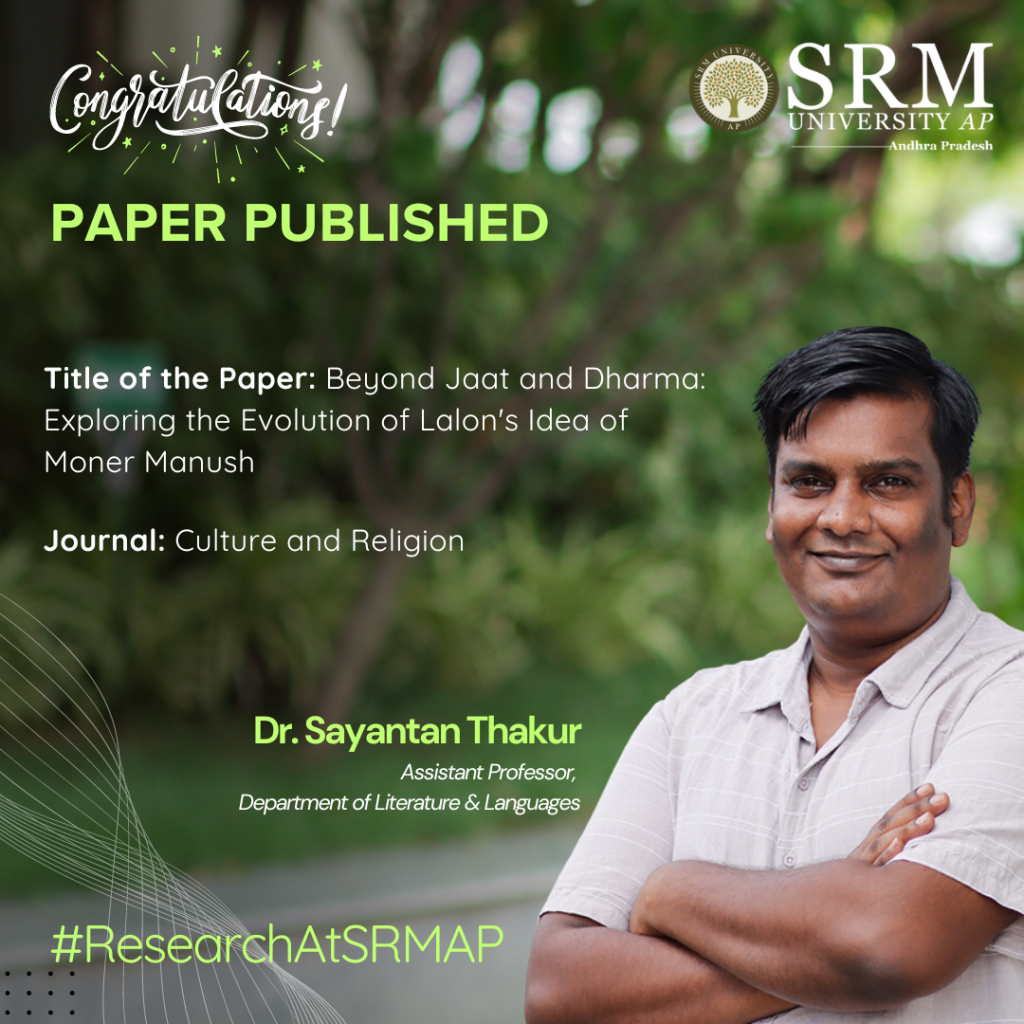
Today, we approach the topics of caste and religion with great sensitivity, aware of the deep-rooted complexities they carry. Yet, here was a character who transcended these societal boundaries, evolving into the embodiment of ‘Moner Manush’—a figure who rose above the constraints of identity to embrace a higher sense of spiritual unity and inclusiveness. Dr Sayantan Thakur, Assistant Professor at the Department of Literature and Languages closely reads into the intricacies of Lalon’s conceptualisation of man and the caste barriers in his research paper.
Abstract:
The paper entitled ‘Beyond ‘Jaat’ and Dharma: Exploring the Evolution of Lalon’s Idea of ‘Moner Manush’ delves into an in-depth exploration of Lalon’s conceptualization of ‘Moner Manush,’ transcending the conventional confines of ‘Jaat’ (caste) and Dharma (religion). Through a nuanced analysis of Lalon’s evolving perspectives, the study traces the transformative journey of the idea of ‘Moner Manush.’ By dissecting the lyrical and philosophical aspects, the paper illuminates how Lalon’s spiritual musings challenge societal norms, promoting a universal ethos that goes beyond distinctions. This inquiry aims to unravel the evolving nature of Lalon’s concept of ‘Moner Manush’ and its enduring significance in fostering inclusivity and spiritual interconnectedness, surpassing the limitations of caste and religion.
Practical Implementation and Social Implications:
The practical implementation of my research on “Beyond ‘Jaat’ and Dharma: Exploring the Evolution of Lalon’s Idea of ‘Moner Manush'” has profound social implications, particularly in fostering inclusivity and breaking down societal barriers. By promoting Lalon’s vision of transcending caste (jaat) and religious (dharma) divisions, this research advocates for a more egalitarian society where people are valued for their inner virtues, not external identities. In practical terms, this philosophy can be integrated into education, community-building, and social reform initiatives to encourage tolerance, empathy, and unity among diverse groups.
In multicultural societies, teaching Lalon’s ideas in schools and community programs can help dismantle deep-seated prejudices and promote cross-cultural understanding. Socially, the emphasis on the Moner Manush—the ideal human being—can encourage individuals to focus on self-reflection, moral development, and compassion, creating a more harmonious coexistence. Additionally, his philosophy can inform contemporary debates on identity politics, helping people prioritize human connections over rigid societal structures.
Future Research Plans
Regional Literature in Translation
Tantric Tradition and Eastern Indian Literature
Folk Music of Bengal
Indian Philosophy, Aesthetics & Literature
Continue reading → - Ayush Bijoura October 14, 2024
- Mr Ratna Raju Publishes Research on UAV-Assisted Service Caching October 14, 2024
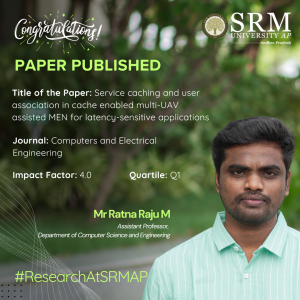 Mr M Ratna Raju, Assistant Professor in the Department of Computer Science and Engineering, has achieved a remarkable milestone by publishing a research paper titled “Service caching and user association in cache-enabled multi-UAV assisted MEN for latency-sensitive applications” in the esteemed Q1 journal, Computers and Electrical Engineering, which boasts an impact factor of 4.0.
Mr M Ratna Raju, Assistant Professor in the Department of Computer Science and Engineering, has achieved a remarkable milestone by publishing a research paper titled “Service caching and user association in cache-enabled multi-UAV assisted MEN for latency-sensitive applications” in the esteemed Q1 journal, Computers and Electrical Engineering, which boasts an impact factor of 4.0.
The paper explores innovative strategies for improving service caching and user association in multi-unmanned aerial vehicle (UAV) networks, addressing challenges faced by latency-sensitive applications. Mr Raju’s research contributes significantly to the field of computer science, particularly in enhancing the efficiency of UAV-assisted networks.This publication not only highlights Mr Raju’s dedication to cutting-edge research but also reinforces SRM University-AP’s commitment to fostering academic excellence and innovation in technology. As the demand for efficient communication networks continues to grow, findings from this study are poised to play a critical role in shaping the future of network architecture and UAV applications.
The academic community and students alike look forward to Mr Raju’s further contributions as he continues to lead impactful research initiatives at SRM University-AP.Abstract of the Research
The evolution of 5G (Fifth Generation) and B5G (Beyond 5G) wireless networks and edge IoT (Internet of Things) devices generates an enormous volume of data. The growth of mobile applications, such as augmented reality, virtual reality, network gaming, and self-driving cars, has increased demand for computation-intensive and latency-critical applications. However, these applications require high computation power and low communication latency, which hinders the large-scale adoption of these technologies in IoT devices due to their inherent low computation and low energy capabilities.
MEC (mobile edge computing) is a prominent solution that improves the quality of service by offloading the services near the users. Besides, in emergencies where network failure exists due to natural calamities, UAVs (Unmanned Aerial Vehicles) can be positioned to reinstate the networking ability by serving as flying base stations and edge servers for mobile edge networks. This article explores computation service caching in a multi-unmanned aerial vehicle-assisted MEC system. The limited resources at the UAV node induce added problems of assigning the existing restricted edge resources to satisfy the user requests and the associate of users to utilise the finite resources effectively. To address the above-mentioned problems, we formulate the service caching and user association problem by placing the diversified latency-critical services to maximise the time utility with the deadline and resource constraints.
The problem is formulated as an integer linear programming (ILP) problem for service placement in mobile edge networks. An approximation algorithm based on the rounding technique is designed to solve the formulated ILP problem. Moreover, a genetic algorithm is designed to address the larger instance of the problem. Simulation results indicate that the proposed service placement schemes considerably enhance the cache hit ratio, load on the cloud and time utility performance compared with existing mechanisms.
Explanation of the Research in Layperson’s Terms
The rapid growth of 5G (Fifth Generation) and B5G (Beyond 5G) wireless networks, along with edge IoT (Internet of Things) devices, is creating a massive amount of data. As mobile applications like augmented reality (AR), virtual reality (VR), online gaming, and self-driving cars become more popular, there’s a greater need for fast, powerful computing. However, IoT devices typically have limited computing power and energy, making it hard to run these advanced applications. Mobile Edge Computing (MEC) offers a solution to this problem by offloading tasks to servers located closer to users, reducing delays and improving performance.
In cases of emergency where network failure occurs due to natural disasters, Unmanned Aerial Vehicles (UAVs) can be used to restore connectivity. UAVs can act as flying base stations and edge servers, helping mobile edge networks continue functioning. This research focuses on improving how computation services are cached and handled in a system that uses multiple UAVs to assist MEC. Since UAVs have limited resources, there’s a challenge in efficiently assigning these resources to meet user demands. The research proposes a solution by formulating this problem as an integer linear programming (ILP) problem, aiming to place services in a way that maximises performance while considering deadlines and resource limits. To solve this complex issue, we use two approaches. First, they apply an approximation algorithm based on a rounding technique to solve the ILP problem. Then, for larger problems, they use a genetic algorithm. Their simulation results show that these service placement strategies significantly improve metrics like cache hit ratio, load reduction on the cloud, and time utility, compared to existing methods.
Practical Implementation and the Social Implications Associated
The practical implementation of this research lies in enhancing the efficiency of real-time, computation-intensive applications like augmented reality (AR), virtual reality (VR), autonomous driving, and network gaming in mobile edge computing (MEC) environments, particularly in scenarios involving Unmanned Aerial Vehicles (UAVs). By optimizing how services are cached and distributed in a multi-UAV-assisted MEC system, the research enables faster data processing and lower latency, which is crucial for applications where even slight delays can cause major issues, such as in self-driving cars or real-time remote surgeries. In emergency situations, such as natural disasters, where ground-based networks may be damaged or overloaded, the deployment of UAVs as flying base stations and edge servers could restore network connectivity quickly and provide essential services. This research ensures that even under such constraints, services are efficiently distributed, enhancing responsiveness and reliability.
Social Implications:
Disaster Relief: UAVs with MEC support could be deployed during natural calamities to restore communication services, helping rescue teams coordinate better and saving lives.
Smart Cities and Autonomous Vehicles: The work contributes to making smart cities more responsive, with real-time data processing and seamless service delivery. Autonomous vehicles, for instance, would benefit from reduced latency, leading to safer and more efficient navigation.
Healthcare: Applications such as telemedicine and remote surgery could operate more effectively with lower latency, improving healthcare delivery in remote or disaster-affected regions.Collaborations
1. Manoj Kumar Somesula and Banalaxmi Brahma from Dr. B. R. Ambedkar National Institute of Technology Jalandhar, Punjab 144008, India.
2. Mallikarjun Reddy Dorsala from Indian Institute of Information Technology Sri City, Chittoor, Andhra Pradesh 517646, India.
3. Sai Krishna Mothku from National Institute of Technology, Tiruchirappalli 620015, IndiaFuture Research Plans
In future, we plan to consider the unique challenge of making caching decisions while accounting for the limited energy capacity of UAVs, mobility of UAVs, network resources, and service dependencies, which introduces new complexities in algorithm design minimising the overall service delay while adhering to constraints such as energy consumption, UAV mobility, and network resources. This would require the joint optimisation of service caching placement, UAV trajectory, UE-UAV association, and task offloading.
Continue reading → - Breakthrough in Autism Detection: A New System Patent by CSE Researchers October 14, 2024
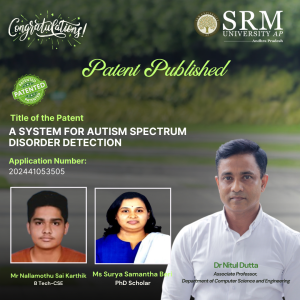 In a significant advancement for neurodevelopmental research, Dr Nitul Dutta, Associate Professor in the Department of Computer Science and Engineering, along with PhD scholar Ms Surya Samantha Beri and BTech student Mr Nallamothu Sai Karthik, have successfully filed and published a patent titled “A System for Autism Spectrum Disorder Detection.” The application, numbered 202441053505, has been officially documented in the Patent Office Journal.
In a significant advancement for neurodevelopmental research, Dr Nitul Dutta, Associate Professor in the Department of Computer Science and Engineering, along with PhD scholar Ms Surya Samantha Beri and BTech student Mr Nallamothu Sai Karthik, have successfully filed and published a patent titled “A System for Autism Spectrum Disorder Detection.” The application, numbered 202441053505, has been officially documented in the Patent Office Journal.The innovative system aims to enhance the early detection of Autism Spectrum Disorder (ASD), providing a more efficient and accessible method for diagnosis. By integrating advanced algorithms and machine learning techniques, the system promises to analyse behavioural data effectively, allowing for timely interventions and support for individuals on the spectrum. Dr Dutta emphasised the importance of early detection, stating, “The earlier we can identify ASD, the better the outcomes for individuals and their families. Our system is designed to make this process more accurate and user-friendly.”
Ms Beri and Mr Karthik contributed significantly to the research, which reflects a collaborative effort between academia and technology. Their work not only demonstrates the potential for technological solutions in healthcare but also highlights the critical role of interdisciplinary approaches in addressing complex challenges.
This patent represents a crucial step forward in the field of autism research and is expected to pave the way for further innovations aimed at improving the lives of those affected by ASD.
Abstract of the Research
The system for autism spectrum disease detection incorporates a server with a hybrid application comprising several key modules: a capturing module receiving images from image-capturing devices , a data collection module gathering a dataset of images from multiple capturing devices, and a pre-processing module standardising and normalising images to generate a standardised dataset. Additionally, a feature extraction module collaborates with the pre-processing module to identify autism-indicative features in standardised images, preparing labelled standardised images stored in the data collection module.
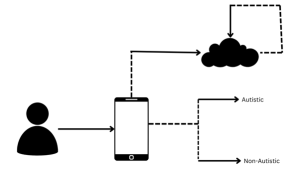
Furthermore, a data segmentation module segments standardised images into training and testing data, including a training module for real-time training of a convolutional neural network model and a testing module to evaluate the convolutional neural network model’s accuracy in detecting autism based on testing data.
Explanation of the Research in Layperson’s Terms
The background information herein below relates to the present disclosure but is not necessarily prior art. Autism spectrum disorder (ASD) is a neurological or developmental disorder that profoundly impacts communication skills, social interaction, and cognitive abilities in individuals. Those with Autism Spectrum Disorder (ASD) often exhibit challenges in social interaction, limited eye contact, difficulty understanding social cues, and impaired language skills. Additionally, repetitive behaviours and sensory sensitivities are common characteristics.
The disorder arises from developmental changes in brain structure and can have various causes, including genetic factors, familial history of autism spectrum disorder (ASD), advanced parental age, or low birth weight. The prevalence of autism spectrum disorder (ASD), as reported by the World Health Organization (WHO), stands at one in every 160 children. Early detection and intervention are crucial for managing autism spectrum disorder (ASD) effectively, as interventions such as medical and neurological examinations, cognitive and language assessments, and frequent observations, including blood and hearing tests, can significantly improve outcomes. Detecting Autism Spectrum Disorder (ASD) in children below the age of 10 is comparatively easier than in adults, underscoring the importance of early diagnosis to facilitate timely interventions.
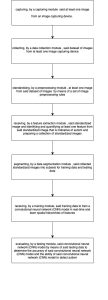
Current diagnostic processes for autism spectrum disorder (ASD) often present significant challenges, particularly for young children, due to their limited ability to communicate and cooperate during assessments. Traditional diagnostic methods rely heavily on structured interviews, behavioural observations, and standardised tests, which can be daunting and stressful for children, leading to inaccurate results. Moreover, these procedures are time-consuming and often require multiple visits to specialised clinics or healthcare facilities, causing inconvenience and financial strain for families. Also, the cost associated with autism spectrum disorder (ASD) diagnosis can be prohibitive for many families.
Therefore, there is a pressing need for more accessible, less intrusive, and cost-effective methods for detecting autism spectrum disorder (ASD) in its early stages to ensure timely and effective intervention. Therefore, there is a need for a system for autism spectrum disorder detection that alleviates the drawbacks.
Practical and Social Implications Associated with the Research
Current diagnostic procedures for Autism Spectrum Disorder (ASD) face considerable technical challenges, particularly concerning young children’s limited ability to engage in conventional assessment methods. These methods typically rely on structured interviews, behavioural observations, and standardised tests, all of which can be arduous and distressing for children with Autism Spectrum Disorder (ASD), potentially leading to unreliable outcomes. Furthermore, these procedures are resource-intensive, requiring multiple visits to specialised clinics or healthcare facilities, thereby causing logistical challenges and financial burdens for families. Current diagnostic processes for Autism Spectrum Disorder (ASD) often present significant challenges, particularly for young children, due to their limited ability to communicate and cooperate during assessments. Traditional diagnostic methods rely heavily on structured interviews, behavioural observations, and standardised tests, which can be daunting and stressful for children, leading to inaccurate results. Moreover, these procedures are time-consuming and often require multiple visits to specialised clinics or healthcare facilities, causing inconvenience and financial strain for families. Also, the cost associated with Autism Spectrum Disorder (ASD) diagnosis can be prohibitive for many families. Therefore, there is a pressing need for more accessible, less intrusive, and cost-effective methods for detecting Autism Spectrum Disorder (ASD) in its early stages to ensure timely and effective intervention.
Collaborations
This research was done in collaboration with Professor George, Brunel University, London, United Kingdom
Future Research Plans
In the future, we will also try to diagnose the disorder by speech therapy using Natural Language Processing and integrate it with real-time industry in health care, which can be used by many doctors in their respective practices
Continue reading → - 1st Private University in India to Send a Student Expedition to Mt. Everest Base Camp October 14, 2024
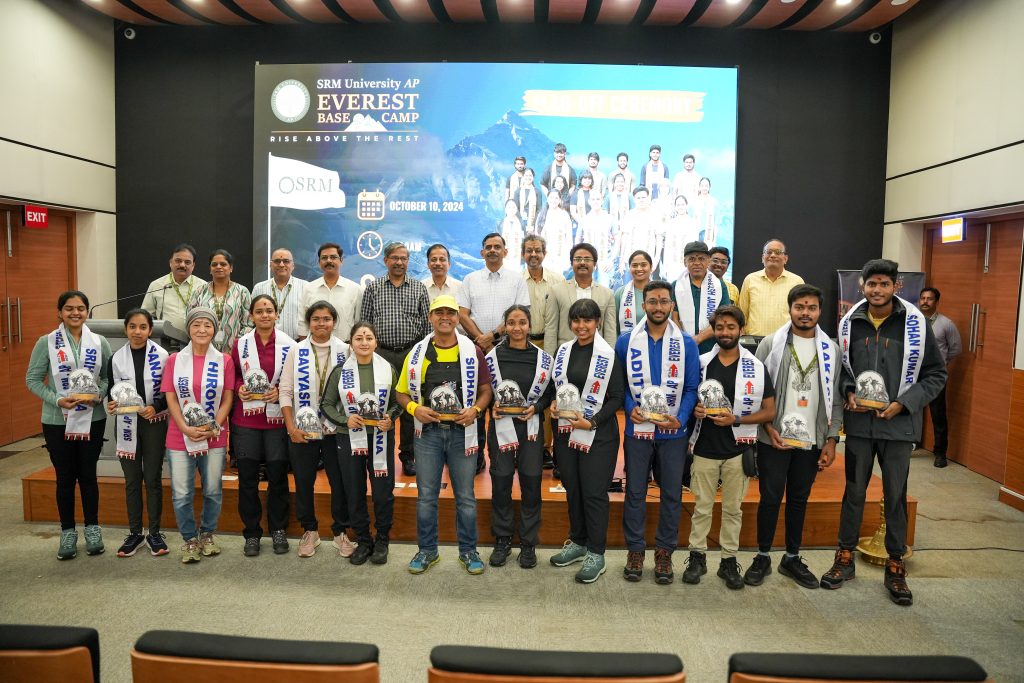
SRM University-AP flagged off the much-awaited Everest Base Camp Expedition that will take place from October 12 – 27, 2024. This is India’s first initiative by any private university in India to send a team of 18 students and faculty under the leadership of Mr Sidharth Tripathy, Director-Entrepreneurship and Innovation, to conquer Mt. Everest Base Camp. The audacious adventure was flagged off by Dr R Premkumar, Registrar, and Prof. Bharadhwaj Sivakumaran, Dean of Paari School of Business, in the presence of Mr Anil Kumar Nigam, Director-Student Affairs, Mr Udayan Bakshi, Associate Director-Entrepreneurship & Innovation, Prof. C V Tomy, Dean-SEAS and the cheering students of the university.
“To enhance the quality of entrepreneurship, it is pivotal to foster a mindset that can take risks, tackle huge challenges and overcome tribulations from a broader perspective. Our motive as a 21st-century university is to cultivate this mindset through this thrilling adventure and to become the harbingers of transformation among students,” remarked the expedition leader, Mr Sidharth Tripathy. The 15-day exhilarating expedition jointly organised by the Directorate of Entrepreneurship & Innovation and the Directorate of Student Affairs will begin from Kathmandu and will reach Everest Base Camp, covering a distance of about 134 km and scaling a height of 17,598 ft.
In his address to the voyagers, Dr R Premkumar wished the group a safe and successful journey and opined, “This is an adventure of a lifetime that will teach you to live as a group, to grow as a team and contribute to each other for a common goal”. In addition to providing students with exemplary academic, research and entrepreneurial resources, SRM University-AP also emphasises the significance of nurturing 21st-century skills through experiential projects and initiatives. The Everest Base Camp expedition is a one-of-a-kind adventure that will ensure that students imbibe the value of belief, the significance of planning, training and camaraderie to develop essential leadership skills.
Continue reading → - Breakthrough in Mathematical Research: Dr Subha Sandeep Repaka’s Innovative Study on Unitary Groups October 10, 2024
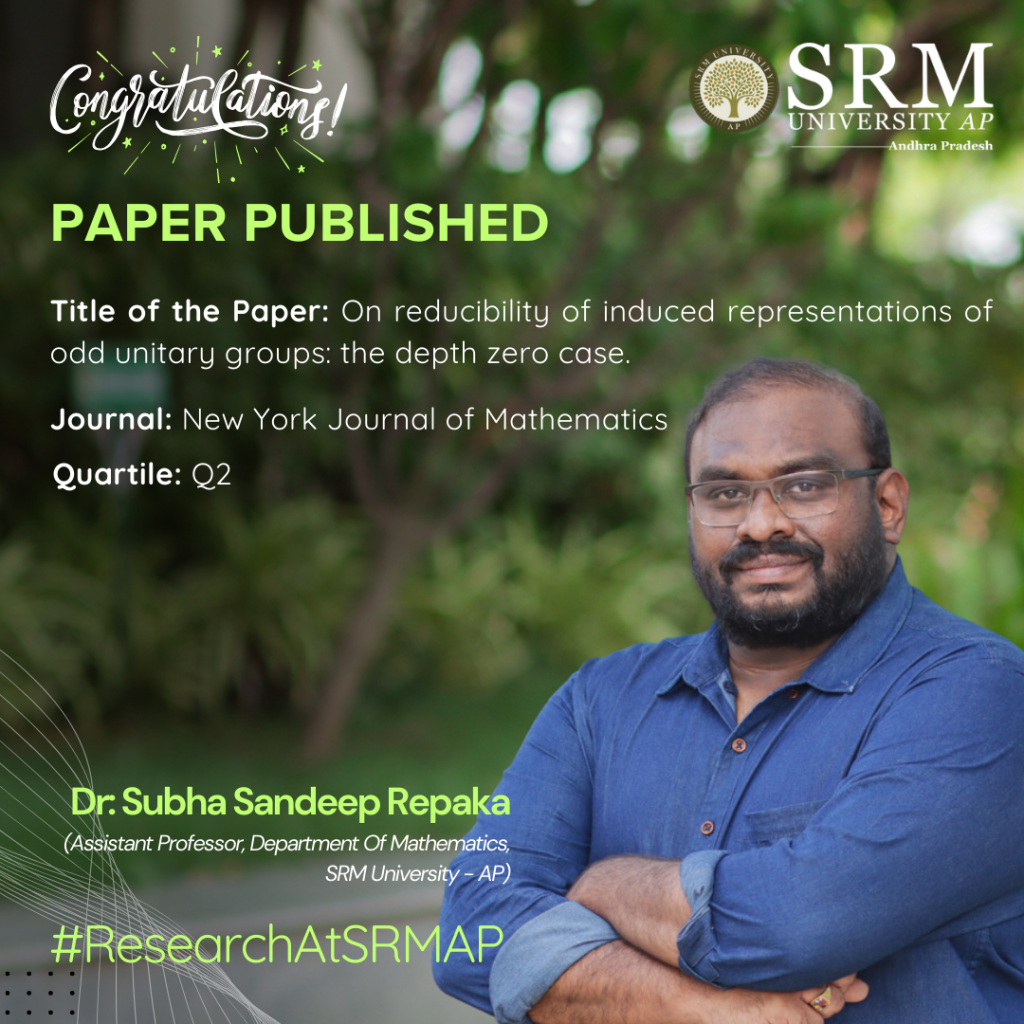
The Department of Mathematics, SRM University-AP, is pleased to announce that Assistant Professor Dr Subha Sandeep Repaka has published a significant research paper titled “On Reducibility of Induced Representations of Odd Unitary Groups: The Depth Zero Case.” This accomplishment reflects Dr Repaka’s expertise and dedication to advancing mathematical research, further enriching the academic contributions of the department and the university.
Abstract:
We study a problem concerning parabolic induction in certain $p$-adic unitary groups. More precisely, for $E/F$ a quadratic extension of $p$-adic fields the associated unitary group $G=\mathrm{U}(n,n+1)$ contains a parabolic subgroup $P$ with Levi component $L$ isomorphic to $\mathrm{GL}_n(E) \times \mathrm{U}_1(E)$. Let $\pi$ be an irreducible supercuspidal representation of $L$ of depth zero. We use Hecke algebra methods to determine when the parabolically induced representation $\iota_P^G \pi$ is reducible.
Future Research Plans:
We would like to solve the same problem which I had solved in this paper for the groups U(n,n) and U(n,n+1) over p-adic fields using L-Functions which is a very novel approach.
The link to the article:
http://nyjm.albany.edu/j/2024/30-50.html
Continue reading →


